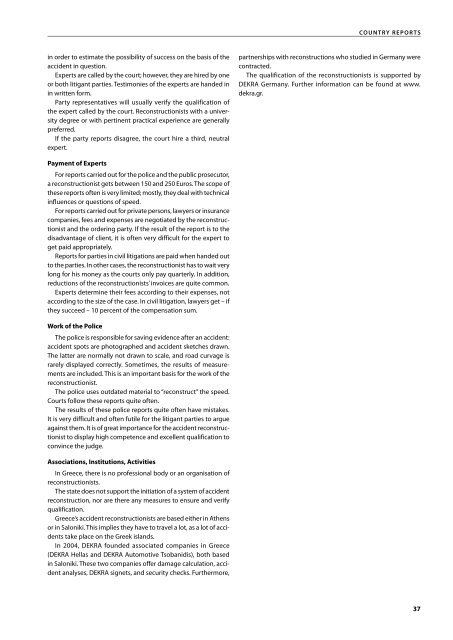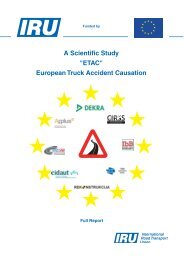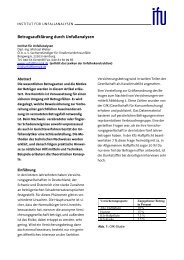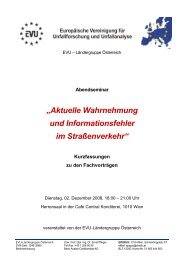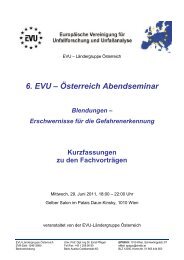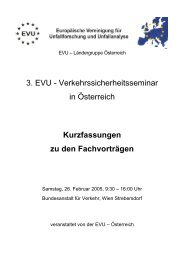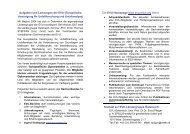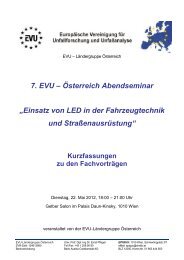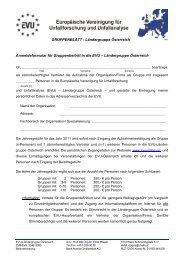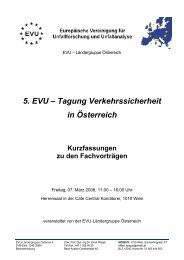THE QUERY PROJECT - European Commission - Europa
THE QUERY PROJECT - European Commission - Europa
THE QUERY PROJECT - European Commission - Europa
You also want an ePaper? Increase the reach of your titles
YUMPU automatically turns print PDFs into web optimized ePapers that Google loves.
in order to estimate the possibility of success on the basis of the<br />
accident in question.<br />
Experts are called by the court; however, they are hired by one<br />
or both litigant parties. Testimonies of the experts are handed in<br />
in written form.<br />
Party representatives will usually verify the qualification of<br />
the expert called by the court. Reconstructionists with a university<br />
degree or with pertinent practical experience are generally<br />
preferred.<br />
If the party reports disagree, the court hire a third, neutral<br />
expert.<br />
Payment of Experts<br />
For reports carried out for the police and the public prosecutor,<br />
a reconstructionist gets between 150 and 250 Euros. The scope of<br />
these reports often is very limited; mostly, they deal with technical<br />
influences or questions of speed.<br />
For reports carried out for private persons, lawyers or insurance<br />
companies, fees and expenses are negotiated by the reconstructionist<br />
and the ordering party. If the result of the report is to the<br />
disadvantage of client, it is often very difficult for the expert to<br />
get paid appropriately.<br />
Reports for parties in civil litigations are paid when handed out<br />
to the parties. In other cases, the reconstructionist has to wait very<br />
long for his money as the courts only pay quarterly. In addition,<br />
reductions of the reconstructionists’ invoices are quite common.<br />
Experts determine their fees according to their expenses, not<br />
according to the size of the case. In civil litigation, lawyers get – if<br />
they succeed – 10 percent of the compensation sum.<br />
work of the Police<br />
The police is responsible for saving evidence after an accident:<br />
accident spots are photographed and accident sketches drawn.<br />
The latter are normally not drawn to scale, and road curvage is<br />
rarely displayed correctly. Sometimes, the results of measurements<br />
are included. This is an important basis for the work of the<br />
reconstructionist.<br />
The police uses outdated material to “reconstruct” the speed.<br />
Courts follow these reports quite often.<br />
The results of these police reports quite often have mistakes.<br />
It is very difficult and often futile for the litigant parties to argue<br />
against them. It is of great importance for the accident reconstructionist<br />
to display high competence and excellent qualification to<br />
convince the judge.<br />
Associations, Institutions, Activities<br />
In Greece, there is no professional body or an organisation of<br />
reconstructionists.<br />
The state does not support the initiation of a system of accident<br />
reconstruction, nor are there any measures to ensure and verify<br />
qualification.<br />
Greece’s accident reconstructionists are based either in Athens<br />
or in Saloniki. This implies they have to travel a lot, as a lot of accidents<br />
take place on the Greek islands.<br />
In 2004, DEKRA founded associated companies in Greece<br />
(DEKRA Hellas and DEKRA Automotive Tsobanidis), both based<br />
in Saloniki. These two companies offer damage calculation, accident<br />
analyses, DEKRA signets, and security checks. Furthermore,<br />
Co u n t R y R E P o R t S<br />
partnerships with reconstructions who studied in Germany were<br />
contracted.<br />
The qualification of the reconstructionists is supported by<br />
DEKRA Germany. Further information can be found at www.<br />
dekra.gr.


